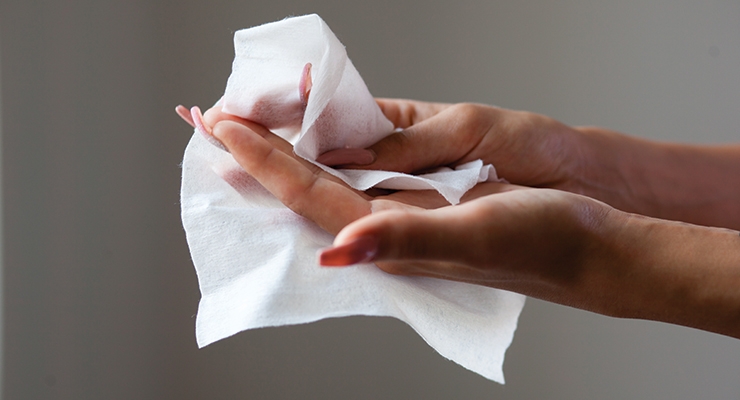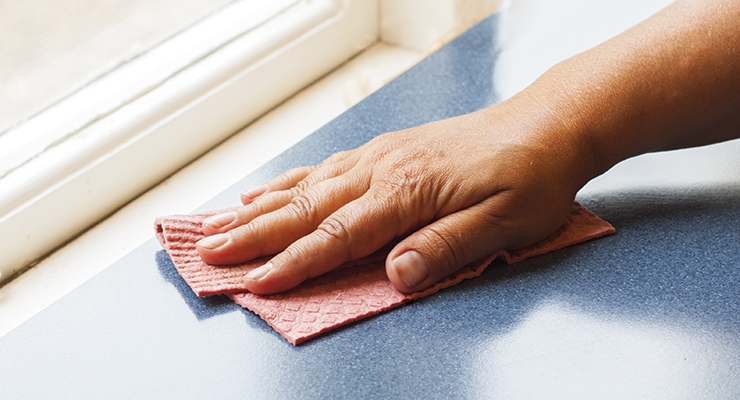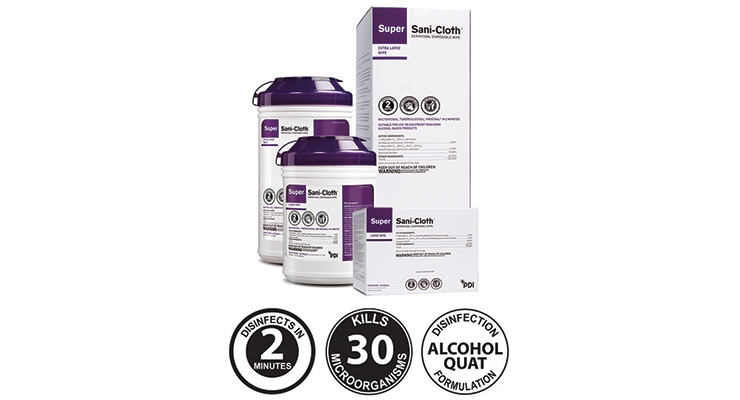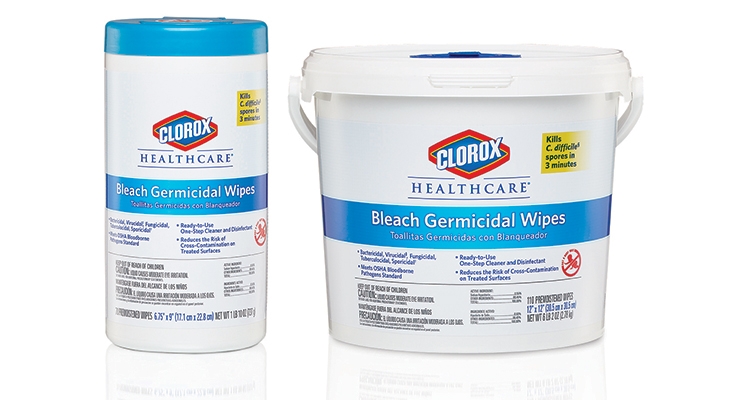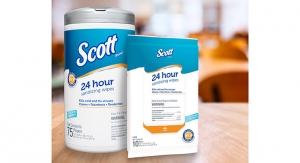Tara Olivo, Associate Editor09.18.17
Specific wipes products that are available to consumers, customers and businesses are regulated through government agencies such as the U.S. Food and Drug Administration (FDA) and U.S. Environmental Protection Agency (EPA).
According to the FDA, the regulation of certain wipes depends upon their intended use. Wipes used for cleansing or moisturizing the skin, such as baby wipes, hand washing, makeup removal, body wipes, feminine care or personal cleansing, as well as wipes that apply products such as deodorant wipes, are regulated as cosmetics. The law doesn’t require cosmetic products or ingredients, other than color additives, to have FDA approval before they go on the market, but these products must be safe when people use them as directed on the label.
While cosmetic products are currently voluntary submissions, Dawn Rubel, vice president, Quality and Regulatory Affairs at PDI/Nice-Pak, explains that companies still need to maintain files on the products—even if they don’t submit them to the FDA. “The FDA at any time can inspect our facility and request to see the data and/or request a call for submission,” she says. “So, it’s not just color additives. There are lists of ingredients that are acceptable for use and there are other lists of ingredients that require testing prior to use and it depends on certain levels. Those ingredient lists are published and we consult those certain ingredient types and certain ingredient levels.”
Wipes intended for a therapeutic purpose, such as killing germs on the skin, or treating acne, or other skin conditions, are drugs under the law. According to the FDA, drugs must meet requirements for FDA approval for safety and effectiveness before they go to market.
On the other hand, wipes that are used to control germs on inanimate surfaces (disinfecting or sanitizing wipes) and wipes containing insect repellents are regulated by the EPA.
Lori Strazdas, MPH, Public Health and Safety Specialist, Clorox Healthcare, says all disinfecting products, regardless of the form (e.g. sprays, pop-tops, wipes, dilutables) sold in the U.S. must be registered with the EPA and recorded in each state prior to market release. “The process may sometimes take up to two years,” she says. “The EPA requires that manufacturers submit a lot of information and data about a product, including a product’s chemistry, micro-efficacy and toxicity. In some cases, the EPA even requires data showing the surface will stay wet for the contact time identified on the product label.”
John Patton, sales & marketing manager, Athea Laboratories, explains other barriers to getting a wipe EPA-registered. “Each state has different registration fees and varying lengths of registration that are required, and it can be a significant obstacle for a company looking to private label an EPA-regulated product,” he says, adding that for the owner of the formula, the registration process is lengthy and expensive for both FDA-regulated and EPA-regulated products.
Barb Noel, business development manager at Kleen Test Products, adds that it is important that wipes manufacturers have regulatory staff who are familiar with the processes and procedures in place to comply with strict cGMPs when manufacturing regulated products. Kleen Test Products helps many of its customers launch regulated products with both the FDA and the EPA.
“Many customers who want to sell a disinfecting or sanitizing product will work with a company who already has a product registered with the EPA,” she says. “They will sub-register the product from the owner of the registered product.”
As far as FDA approved wipes, Kleen Test manufactures many FDA regulated products for the medical and health and beauty markets. These products, which are used on the skin, include acne pads and first aid wipes and have active ingredients such as benzoyl peroxide, hydrogen peroxide, isopropyl alcohol and salicylic acid.
Kleen Test also produces a number of EPA surface disinfecting products for wipes that are used on hard surfaces. Typical active ingredients that are used in these products are Quaternary compounds, alcohol, bleach and hydrogen peroxide. “Some of these active ingredients require specialized filling facilities and equipment. Kleen Test Products has the infrastructure and equipment necessary to manufacture these products under both FDA and EPA guidelines,” Noel explains.
Registered wipes are good business for companies that can comply with the regulations, she adds. “If you can meet these requirements, it sets you apart from other manufacturers who do not have the infrastructure to handle the EPA/FDA requirements for these products. Since Kleen Test Products offers these technical services in house, we can help our customers get products into the marketplace efficiently and in compliance with all applicable regulations.”
All three of Nice-Pak’s and PDI’s manufacturing locations in North America are registered with both the FDA and EPA—in Orangeburg, NY (PDI), Mooresville, IN (Nice-Pak), and Jonesboro, AR (Nice-Pak).
Describing their regulated wipes offerings in general terms, Rubel says Nice-Pak and PDI offer wipes and wipe type formats in six different regulatory categories. They include the EPA-registered disinfectant, as well as the following categories registered with the FDA: drugs, medical device, cosmetic, consumer and FSMA (Food Safety Modernization Act) regulated products, which are for food contact surfaces.
In explaining the process of determining the types of claims desired for the product itself and then getting the product approved, Rubel says she works with the marketing and sales teams as well as the R&D team. “We need to ensure that we are meeting the regulatory requirements to assure successful registration for those categories.”
Even if certain wipes are not necessarily regulated by the FDA or the EPA, Rubel says all products are regulated to some degree through entities such as the Federal Trade Commission and the Consumer Products Safety Commission. These entities require companies to maintain appropriate data, and maintain appropriate controls for the product, so that they can ensure there is no danger to public heath. Examples Rubel cites are oil wipes or screen wipes for electronics. “They could be cleaners, they could have no need for registration with FDA or EPA, but they do require verification of ingredient lists for safety and they require maintaining the appropriate data for claiming product shelf life or whatever we’re saying we’re doing; we have to have data that ensures that we are substantiating that.”
Rubel says there is a business benefit from offering multiple regulatory categories. “Naturally there are some products that are more profitable than others, but in the interest of building relationships with our customers and consumers in offering solutions, not just products, it is our mission to ensure that we take this format and make sure that it is maximized for use across the globe for any kind of application.”
At its site in Milwaukee, WI, Athea Laboratories has manufactured and private labeled specialty chemicals and wet wipes for over 50 years. The company’s manufacturing facility is an FDA- and EPA-regulated facility. Athea has numerous stock products that it manufactures for use on the body and on surfaces as well as the ability to take a customer-owned formulation and manufacture it.
“One of the advantages of working with Athea Laboratories is that we are an approved manufacturer for several companies that each own multiple registrations. This allows customers to find products that suit their specific needs,” Patton explains.
On the FDA side, Athea offers an alcohol-based and an alcohol-free hand sanitizing wipe formulation that can be produced in a number of different sizes. For EPA-registered products, Athea has mainly quat-based sanitizing and disinfecting wipes, but they have done numerous other formulations that utilize other active ingredients. “From the manufacturing side, Athea’s ability to produce both EPA-regulated and FDA-regulated products as well as the ability to blend the solutions that go into those wipes opens the door to a lot of different customers looking for full turnkey solutions to their product needs,” Patton says. “From the customer’s perspective, a registered wipe is going to have a very clear and specific set of features and benefits, and this can be used to compare and differentiate products. Those features and benefits could be the dwell time necessary to achieve sanitization or disinfection or the specific organisms that are being targeted.”
Meanwhile, Clorox Healthcare offers a variety of ready-to-use wipes products that are registered with the EPA, to provide healthcare facilities with a comprehensive approach to environmental hygiene for HAI (healthcare-associated infections) prevention.
Earlier this year, Clorox Healthcare voluntarily tested two of its leading ready-to-use bleach disinfectants using updated EPA recommended standards, to ensure its disinfectants continue to meet the highest standards of efficacy. Following testing, Clorox Healthcare announced that its Clorox Healthcare Bleach Germicidal Wipes and Clorox Healthcare Bleach Germicidal Cleaners are now EPA-registered to kill C. difficile spores in three minutes, tested in the presence of a three-part organic soil load, and have gained new disinfection claims for emerging viral pathogens including SARS-associated Coronavirus (SARS-CoV), Middle East Respiratory Syndrome-associated Coronavirus (MERS-CoV) and other common causes of HAIs.
Strazdas of Clorox Healthcare says it’s important that they offer a range of EPA-registered wipes. “Different wipes meet different end-user needs,” she explains. “For example, our Clorox Healthcare Bleach Germicidal Wipes and Clorox Healthcare Hydrogen Peroxide Cleaner Disinfectant Wipes come in multiple sizes so you can use a larger wipe for a bigger surface like bedside tables and countertops and a smaller one for a smaller surfaces like nursing stations and use on equipment. Our broad portfolio of wipes are easy to use, contain the proper concentration of disinfectant and reduce compliance issues associated with mixing chemicals.”
For its part, wipes manufacturer Rockline Industries has formed a new subsidiary, Iatric Manufacturing Subsidiaries, dedicated to help healing foster healthy environments through the design and manufacturing of FDA-regulated wipes for use in the consumer, healthcare, food service and hospital industries.
Iatric will operate out of a new 435,000-square-foot, state-of-the-art FDA-registered facility in Morristown, TN. The wholly owned subsidiary was born out of the rapidly increasing demand for Rockline’s wet wipes products that are designed to support healthier, sanitary environments and better personal hygiene. The new plant will be operational beginning in 2018 and is expected to employ 250 people.
“Rockline is on the forefront of wet wipes product innovation and design. With the creation of Iatric, we will continue our company’s tradition of turning great ideas into convenient solutions that help people lead cleaner, healthier lives,” says Will Green, vice president of contract manufacturing services, Rockline Industries.
According to the FDA, the regulation of certain wipes depends upon their intended use. Wipes used for cleansing or moisturizing the skin, such as baby wipes, hand washing, makeup removal, body wipes, feminine care or personal cleansing, as well as wipes that apply products such as deodorant wipes, are regulated as cosmetics. The law doesn’t require cosmetic products or ingredients, other than color additives, to have FDA approval before they go on the market, but these products must be safe when people use them as directed on the label.
While cosmetic products are currently voluntary submissions, Dawn Rubel, vice president, Quality and Regulatory Affairs at PDI/Nice-Pak, explains that companies still need to maintain files on the products—even if they don’t submit them to the FDA. “The FDA at any time can inspect our facility and request to see the data and/or request a call for submission,” she says. “So, it’s not just color additives. There are lists of ingredients that are acceptable for use and there are other lists of ingredients that require testing prior to use and it depends on certain levels. Those ingredient lists are published and we consult those certain ingredient types and certain ingredient levels.”
Wipes intended for a therapeutic purpose, such as killing germs on the skin, or treating acne, or other skin conditions, are drugs under the law. According to the FDA, drugs must meet requirements for FDA approval for safety and effectiveness before they go to market.
On the other hand, wipes that are used to control germs on inanimate surfaces (disinfecting or sanitizing wipes) and wipes containing insect repellents are regulated by the EPA.
Lori Strazdas, MPH, Public Health and Safety Specialist, Clorox Healthcare, says all disinfecting products, regardless of the form (e.g. sprays, pop-tops, wipes, dilutables) sold in the U.S. must be registered with the EPA and recorded in each state prior to market release. “The process may sometimes take up to two years,” she says. “The EPA requires that manufacturers submit a lot of information and data about a product, including a product’s chemistry, micro-efficacy and toxicity. In some cases, the EPA even requires data showing the surface will stay wet for the contact time identified on the product label.”
John Patton, sales & marketing manager, Athea Laboratories, explains other barriers to getting a wipe EPA-registered. “Each state has different registration fees and varying lengths of registration that are required, and it can be a significant obstacle for a company looking to private label an EPA-regulated product,” he says, adding that for the owner of the formula, the registration process is lengthy and expensive for both FDA-regulated and EPA-regulated products.
Barb Noel, business development manager at Kleen Test Products, adds that it is important that wipes manufacturers have regulatory staff who are familiar with the processes and procedures in place to comply with strict cGMPs when manufacturing regulated products. Kleen Test Products helps many of its customers launch regulated products with both the FDA and the EPA.
“Many customers who want to sell a disinfecting or sanitizing product will work with a company who already has a product registered with the EPA,” she says. “They will sub-register the product from the owner of the registered product.”
As far as FDA approved wipes, Kleen Test manufactures many FDA regulated products for the medical and health and beauty markets. These products, which are used on the skin, include acne pads and first aid wipes and have active ingredients such as benzoyl peroxide, hydrogen peroxide, isopropyl alcohol and salicylic acid.
Kleen Test also produces a number of EPA surface disinfecting products for wipes that are used on hard surfaces. Typical active ingredients that are used in these products are Quaternary compounds, alcohol, bleach and hydrogen peroxide. “Some of these active ingredients require specialized filling facilities and equipment. Kleen Test Products has the infrastructure and equipment necessary to manufacture these products under both FDA and EPA guidelines,” Noel explains.
Registered wipes are good business for companies that can comply with the regulations, she adds. “If you can meet these requirements, it sets you apart from other manufacturers who do not have the infrastructure to handle the EPA/FDA requirements for these products. Since Kleen Test Products offers these technical services in house, we can help our customers get products into the marketplace efficiently and in compliance with all applicable regulations.”
All three of Nice-Pak’s and PDI’s manufacturing locations in North America are registered with both the FDA and EPA—in Orangeburg, NY (PDI), Mooresville, IN (Nice-Pak), and Jonesboro, AR (Nice-Pak).
Describing their regulated wipes offerings in general terms, Rubel says Nice-Pak and PDI offer wipes and wipe type formats in six different regulatory categories. They include the EPA-registered disinfectant, as well as the following categories registered with the FDA: drugs, medical device, cosmetic, consumer and FSMA (Food Safety Modernization Act) regulated products, which are for food contact surfaces.
In explaining the process of determining the types of claims desired for the product itself and then getting the product approved, Rubel says she works with the marketing and sales teams as well as the R&D team. “We need to ensure that we are meeting the regulatory requirements to assure successful registration for those categories.”
Even if certain wipes are not necessarily regulated by the FDA or the EPA, Rubel says all products are regulated to some degree through entities such as the Federal Trade Commission and the Consumer Products Safety Commission. These entities require companies to maintain appropriate data, and maintain appropriate controls for the product, so that they can ensure there is no danger to public heath. Examples Rubel cites are oil wipes or screen wipes for electronics. “They could be cleaners, they could have no need for registration with FDA or EPA, but they do require verification of ingredient lists for safety and they require maintaining the appropriate data for claiming product shelf life or whatever we’re saying we’re doing; we have to have data that ensures that we are substantiating that.”
Rubel says there is a business benefit from offering multiple regulatory categories. “Naturally there are some products that are more profitable than others, but in the interest of building relationships with our customers and consumers in offering solutions, not just products, it is our mission to ensure that we take this format and make sure that it is maximized for use across the globe for any kind of application.”
At its site in Milwaukee, WI, Athea Laboratories has manufactured and private labeled specialty chemicals and wet wipes for over 50 years. The company’s manufacturing facility is an FDA- and EPA-regulated facility. Athea has numerous stock products that it manufactures for use on the body and on surfaces as well as the ability to take a customer-owned formulation and manufacture it.
“One of the advantages of working with Athea Laboratories is that we are an approved manufacturer for several companies that each own multiple registrations. This allows customers to find products that suit their specific needs,” Patton explains.
On the FDA side, Athea offers an alcohol-based and an alcohol-free hand sanitizing wipe formulation that can be produced in a number of different sizes. For EPA-registered products, Athea has mainly quat-based sanitizing and disinfecting wipes, but they have done numerous other formulations that utilize other active ingredients. “From the manufacturing side, Athea’s ability to produce both EPA-regulated and FDA-regulated products as well as the ability to blend the solutions that go into those wipes opens the door to a lot of different customers looking for full turnkey solutions to their product needs,” Patton says. “From the customer’s perspective, a registered wipe is going to have a very clear and specific set of features and benefits, and this can be used to compare and differentiate products. Those features and benefits could be the dwell time necessary to achieve sanitization or disinfection or the specific organisms that are being targeted.”
Meanwhile, Clorox Healthcare offers a variety of ready-to-use wipes products that are registered with the EPA, to provide healthcare facilities with a comprehensive approach to environmental hygiene for HAI (healthcare-associated infections) prevention.
Earlier this year, Clorox Healthcare voluntarily tested two of its leading ready-to-use bleach disinfectants using updated EPA recommended standards, to ensure its disinfectants continue to meet the highest standards of efficacy. Following testing, Clorox Healthcare announced that its Clorox Healthcare Bleach Germicidal Wipes and Clorox Healthcare Bleach Germicidal Cleaners are now EPA-registered to kill C. difficile spores in three minutes, tested in the presence of a three-part organic soil load, and have gained new disinfection claims for emerging viral pathogens including SARS-associated Coronavirus (SARS-CoV), Middle East Respiratory Syndrome-associated Coronavirus (MERS-CoV) and other common causes of HAIs.
Strazdas of Clorox Healthcare says it’s important that they offer a range of EPA-registered wipes. “Different wipes meet different end-user needs,” she explains. “For example, our Clorox Healthcare Bleach Germicidal Wipes and Clorox Healthcare Hydrogen Peroxide Cleaner Disinfectant Wipes come in multiple sizes so you can use a larger wipe for a bigger surface like bedside tables and countertops and a smaller one for a smaller surfaces like nursing stations and use on equipment. Our broad portfolio of wipes are easy to use, contain the proper concentration of disinfectant and reduce compliance issues associated with mixing chemicals.”
For its part, wipes manufacturer Rockline Industries has formed a new subsidiary, Iatric Manufacturing Subsidiaries, dedicated to help healing foster healthy environments through the design and manufacturing of FDA-regulated wipes for use in the consumer, healthcare, food service and hospital industries.
Iatric will operate out of a new 435,000-square-foot, state-of-the-art FDA-registered facility in Morristown, TN. The wholly owned subsidiary was born out of the rapidly increasing demand for Rockline’s wet wipes products that are designed to support healthier, sanitary environments and better personal hygiene. The new plant will be operational beginning in 2018 and is expected to employ 250 people.
“Rockline is on the forefront of wet wipes product innovation and design. With the creation of Iatric, we will continue our company’s tradition of turning great ideas into convenient solutions that help people lead cleaner, healthier lives,” says Will Green, vice president of contract manufacturing services, Rockline Industries.

